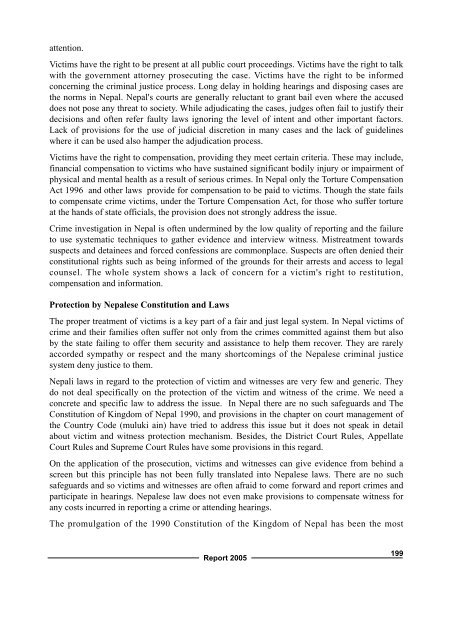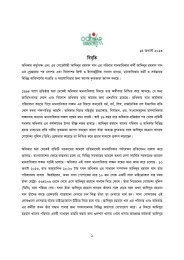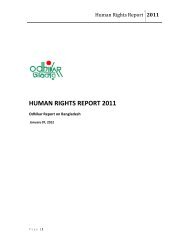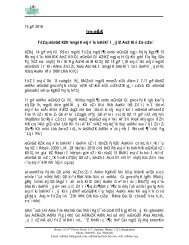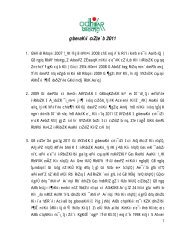Please - Odhikar
Please - Odhikar
Please - Odhikar
Create successful ePaper yourself
Turn your PDF publications into a flip-book with our unique Google optimized e-Paper software.
attention.<br />
Victims have the right to be present at all public court proceedings. Victims have the right to talk<br />
with the government attorney prosecuting the case. Victims have the right to be informed<br />
concerning the criminal justice process. Long delay in holding hearings and disposing cases are<br />
the norms in Nepal. Nepal's courts are generally reluctant to grant bail even where the accused<br />
does not pose any threat to society. While adjudicating the cases, judges often fail to justify their<br />
decisions and often refer faulty laws ignoring the level of intent and other important factors.<br />
Lack of provisions for the use of judicial discretion in many cases and the lack of guidelines<br />
where it can be used also hamper the adjudication process.<br />
Victims have the right to compensation, providing they meet certain criteria. These may include,<br />
financial compensation to victims who have sustained significant bodily injury or impairment of<br />
physical and mental health as a result of serious crimes. In Nepal only the Torture Compensation<br />
Act 1996 and other laws provide for compensation to be paid to victims. Though the state fails<br />
to compensate crime victims, under the Torture Compensation Act, for those who suffer torture<br />
at the hands of state officials, the provision does not strongly address the issue.<br />
Crime investigation in Nepal is often undermined by the low quality of reporting and the failure<br />
to use systematic techniques to gather evidence and interview witness. Mistreatment towards<br />
suspects and detainees and forced confessions are commonplace. Suspects are often denied their<br />
constitutional rights such as being informed of the grounds for their arrests and access to legal<br />
counsel. The whole system shows a lack of concern for a victim's right to restitution,<br />
compensation and information.<br />
Protection by Nepalese Constitution and Laws<br />
The proper treatment of victims is a key part of a fair and just legal system. In Nepal victims of<br />
crime and their families often suffer not only from the crimes committed against them but also<br />
by the state failing to offer them security and assistance to help them recover. They are rarely<br />
accorded sympathy or respect and the many shortcomings of the Nepalese criminal justice<br />
system deny justice to them.<br />
Nepali laws in regard to the protection of victim and witnesses are very few and generic. They<br />
do not deal specifically on the protection of the victim and witness of the crime. We need a<br />
concrete and specific law to address the issue. In Nepal there are no such safeguards and The<br />
Constitution of Kingdom of Nepal 1990, and provisions in the chapter on court management of<br />
the Country Code (muluki ain) have tried to address this issue but it does not speak in detail<br />
about victim and witness protection mechanism. Besides, the District Court Rules, Appellate<br />
Court Rules and Supreme Court Rules have some provisions in this regard.<br />
On the application of the prosecution, victims and witnesses can give evidence from behind a<br />
screen but this principle has not been fully translated into Nepalese laws. There are no such<br />
safeguards and so victims and witnesses are often afraid to come forward and report crimes and<br />
participate in hearings. Nepalese law does not even make provisions to compensate witness for<br />
any costs incurred in reporting a crime or attending hearings.<br />
The promulgation of the 1990 Constitution of the Kingdom of Nepal has been the most<br />
Report 2005<br />
199


